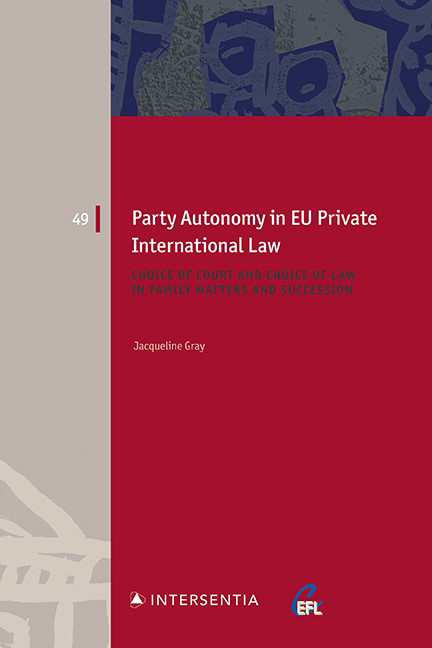 Party Autonomy in EU Private International Law
Party Autonomy in EU Private International Law Published online by Cambridge University Press: 25 May 2021
PREMISE
During the course of the past 20 years, the EU has undertaken the ambitious task of unifying – ‘Europeanising‘ – private international law rules on a supranational level. As part of this mission to create ‘a genuine European area of justice‘ for those that make use of their free movement rights within the Union, several instruments have been introduced that specifically address family matters (matrimonial matters, parental responsibility, property relations and maintenance) and succession. The process of unifying private international law rules on a Union level is distinguished not only by its ambitious scale, but also by its tendency towards novelty.
Arguably one of the most prominent of such developments is the widespread inclusion of party autonomy in the EU‘s instruments concerning family matters and succession. Although party autonomy is not unheard of within Member States‘ own jurisdictional and conflict-of-laws rules on these topics, its appearance has until now been sporadic between states and subject areas. Its large-scale introduction within the realm of cross-border family matters and succession in Europe provides considerable scope for examination. Most notably, there has been to date little scrutiny concerning the purpose and validity of its introduction in the European Union context.
This book pursues an examination of the party autonomy provisions established within the EU‘s instruments on family matters and succession in view of the status of such rules as measures of Union law. This involves identifying the particular values that the EU attaches to party autonomy, as well as the more general objectives behind legislative action in the Union setting, and evaluating the coherence of these provisions with the established parameters. The conclusions that are generated will present a valuable critique of the ‘state of affairs‘ following the flurry of legislative activity that has taken place over the past two decades.
DELINEATION OF PARTY AUTONOMY
In concise terms, the concept of party autonomy refers to the opportunity for parties to make a choice of court or choice of law agreement (or, in the case of a succession, a professio juris) in the private international law context. It should be distinguished from the related (but distinct) notion of private autonomy in substantive law.
To save this book to your Kindle, first ensure [email protected] is added to your Approved Personal Document E-mail List under your Personal Document Settings on the Manage Your Content and Devices page of your Amazon account. Then enter the ‘name’ part of your Kindle email address below. Find out more about saving to your Kindle.
Note you can select to save to either the @free.kindle.com or @kindle.com variations. ‘@free.kindle.com’ emails are free but can only be saved to your device when it is connected to wi-fi. ‘@kindle.com’ emails can be delivered even when you are not connected to wi-fi, but note that service fees apply.
Find out more about the Kindle Personal Document Service.
To save content items to your account, please confirm that you agree to abide by our usage policies. If this is the first time you use this feature, you will be asked to authorise Cambridge Core to connect with your account. Find out more about saving content to Dropbox.
To save content items to your account, please confirm that you agree to abide by our usage policies. If this is the first time you use this feature, you will be asked to authorise Cambridge Core to connect with your account. Find out more about saving content to Google Drive.